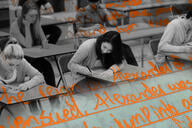You have /5 articles left.
Sign up for a free account or log in.
Why [do] people who [know] Dr. Bishop only through reading about her crime make excuses for her?
Jonathan D. Moreno, a professor of medical ethics and the history and sociology of science at the University of Pennsylvania, thinks reactions have to do with a long tradition that goes back to Plato. The idea, he said, is that someone who is very intelligent is assumed to be “morally wise.” And that makes it hard to reconcile the actions of Amy Bishop, with her Harvard Ph.D., her mantle of scientific brilliance.
“There’s a common-folk psychology," Dr. Moreno said. “If you are that smart, you know the difference between right and wrong.”
“That is what’s going on,” Dr. Moreno said. “In cases like hers that contradict the framework, we look for excuses.”
A blogger at the New York Times tries to understand the striking tendency of many people to make excuses for -- to rationalize, really -- Amy Bishop's systematic, cold-blooded slaughter of her colleagues.
This is a woman who planned. She got a gun. She went to shooting ranges and practiced. She committed the murders with calm precision. Moments after ditching the gun, she called her husband, and, in an even tone that made him suspect nothing, she told him she was ready for their dinner date.
The New York Times blogger notes some of the excuses for this behavior that she's heard from readers: "[G]enius is close to madness ... women cannot get ahead in science ...tenure systems in universities are brutalizing..."
Moreno explains that because Bishop as a human type falls impossibly far outside the criminal paradigm (she's a woman, a professor, a wife and mother, a Harvard PhD), we don't actually believe she's a criminal. A priestess of intellect, an adept in the cathedral of higher learning, Bishop must have been driven mad by the brutality of tenure denial...
**************************************
But let's go back to that suggestion that really smart people must know the difference between right and wrong.
Yes. They do. That doesn't mean that they will, as a result of knowing the difference, show a preference for right. Bernie Madoff, Ezra Merkin, the Goldman Sachs guys, the hordes of Wharton-educated hedgies going to prison this week -- they're all real smart, plus real aware of the right v. wrong thing. They're as aware of it as the raft of Jersey rabbis arrested for extortion a couple of months ago.
All of these people, just like Amy Bishop, believe they're better than everybody else, and that moral rules don't apply to them. They don't go as far as Amy and actually kill people who threaten their sense of superiority, but they ruin hundreds and hundreds of lives because they believe they have the right to rob people who don't count, and to undermine economic systems if the systems frustrate their goals, and to amass hundreds of millions of criminally-generated dollars in personal wealth.
They know that by conventional standards this behavior is wrong. Those standards do not apply to them, because they are above them, as they are above other human beings.
Leopold and Loeb's understanding of moral philosophy was profound. So was their conviction that morality didn't apply to higher beings.
***************************************
How then did Amy Bishop's particular evil play out? Maybe it was something like this:
She knew, from murdering her brother and then terrorizing several people on the street of Braintree, that holding and shooting guns can generate an intensely pleasurable sense of power. With a gun in her hand pointed at terrified human beings, Dr. Amy Bishop, world-historical genius, is exactly where she should be relative to the world -- not inferior to anyone, but vastly, awesomely superior. With a gun in her hand, God's in his heaven and all's right with the world.
In killing people who make the mistake of making Amy Bishop feel inferior, Amy Bishop sets things right again.
She's a lot like the guys Truman Capote wrote about in In Cold Blood. They celebrated for hours after systematically, cold-bloodedly killling four people. They said they killed them because at some point Herbert Clutter made them feel small, made them feel he thought he was better than they were. In killing him they put things back where they were supposed to be, and that made them euphoric. They showed him but good.
*****************************************
Bishop taught a class that day, before she started shooting. One of her students told an interviewer that Bishop had "a lazy left eye... But in the class just hours before the shooting, it no longer seemed lazy. It seemed fixed." As she shot, reported a survivor of the massacre, Bishop had "intense eyes, a set jaw.”
All the depletion of godlike being Bishop had suffered since her colleagues disrespected her, all the enervation of charisma and brilliancy and focus, had finally come to an end now, in this triumphant fulfillment.

